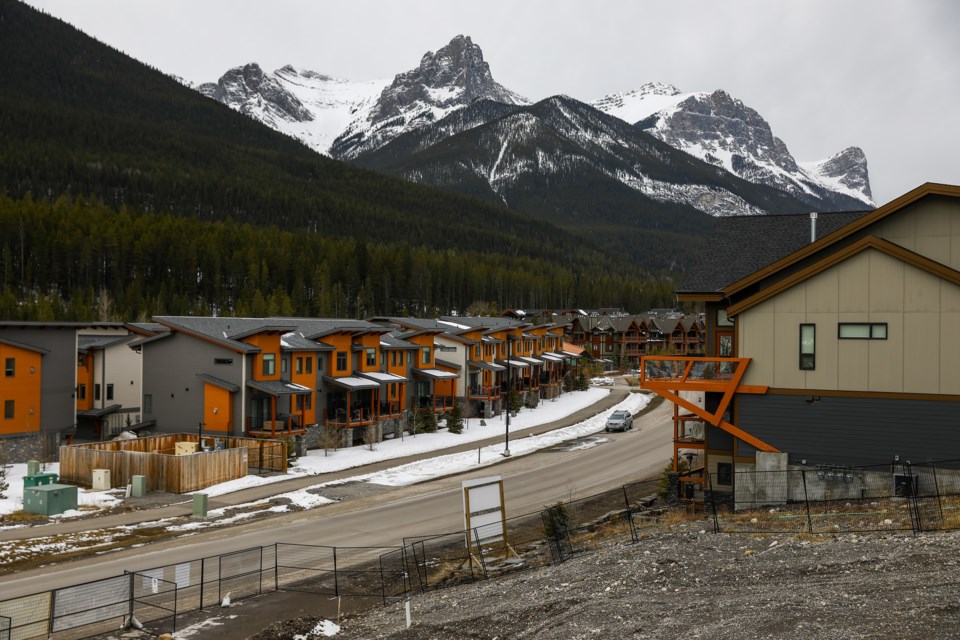CALGARY – A Court of Appeal decision will see two of three groups be given intervenor status for the upcoming leave to appeal hearing that was filed by the Town of Canmore for the Land and Property Rights Tribunal’s order to adopt the Smith Creek and Three Sisters Village area structure plans.
The Stoney Nakoda First Nation and Natural Resources Conservation Board (NRCB) each received the status, while Bow Valley Engage (BVE) was denied.
The 13-page decision outlined the Stoney Nakoda and NRCB were allowed to provide a written submission no longer than 10 pages and they will be able to present an oral argument of up to 15 minutes at the leave to appeal hearing.
“All parties should be prepared to address the degree to which the NRCB and the [Stoney Nakoda] should participate in the ongoing appeal in the event permission to appeal is granted,” Justice Bernette Ho’s decision stated.
The Stoney Nakoda First Nation originally applied for party status, however, the ruling saw them receive the lesser intervenor status with “the threshold for party status is necessarily greater than that for intervenor status.”
Legal representation for the Stoney Nakoda said they had no intent to attempt to overturn the 1992 NRCB decision, but that the LPRT made an error in not considering honour of the Crown and reconciliation in determining the consistency of the ASPs in relation to the NRCB decision.
Ho’s decision permitted the Stoney Nakoda as intervenors due to them having the same position at the LPRT hearings and that the Stoney Nakoda’s “interests may not be fully protected by the other parties.”
However, Ho’s decision emphasized no new issues would be permitted and “if the [Stoney Nakoda] raised new issues, and in particular, constitutional issues, that would be of concern to this court.”
She reiterated the Stoney Nakoda would only be allowed to address four specific subparagraphs being discussed in the permission to seek an appeal.
BVE played a prominent role in Canmore during the leadup to the council vote that denied both ASPs, but didn’t take part in the LPRT hearings earlier this year.
The decision highlighted a factor in receiving status was participation at the tribunal hearings since the “court generally discourages the addition of parties or intervenors at the permission to appeal stage.”
At the hearing, Ho was critical of the argument BD&P – the Calgary-based law firm representing BVE – and that the Court of Appeal was only there to decide a question of law or jurisdiction when it came to the LPRT’s decisions.
She wasn’t satisfied with BVE’s legal argument to receive intervenor status due to it not being an intervenor at the LPRT hearings, wasn't a society until after the LPRT decisions were rendered and “nor do they offer a special expertise that would assist the court in deciding whether to grant permission to appeal.”
“I fully appreciate how important the possibility of a continuing appeal is to the BVE and its membership, but I am not satisfied that extraordinary circumstances exist to warrant being granted intervenor status at this juncture,” she wrote in the decision.
The NRCB received intervenor status due to the 1992 NRCB decision being “central importance” in the LPRT hearings, it being an intervenor at the tribunal hearings, the NRCB not wanting to add new evidence and it being a central party in the dispute between the Town and TSMVPL.
“As the regulatory authority that issued the prior NRCB approval, will be affected by the outcome of the appeal and it can offer special expertise, perspective or information that will assist the court in deciding whether to grant permission to appeal,” the decision stated.
Throughout the process, the NRCB has not taken a stance and has been a participant to provide any information potentially needed by the tribunal and now the courts.
However, the board’s legal representation has been adamant that there should be no expiry date on the 1992 decision and a weakening of the NRCB’s mandate.
Both the Stoney Nakoda First Nation and NRCB have been involved with the lands, dating back to the 1991 NRCB hearings.
The NRCB and Stoney Nakoda were intervenors at the LPRT hearings along with Yellowstone to Yukon (Y2Y) Conservation Initiative. They didn’t apply to be intervenors for the Court of Appeal leave to appeal hearing.
Canmore is seeking permission to appeal based on nine grounds such as the tribunal erred in its jurisdiction, the LPRT misinterpreted Section 619 of the Municipal Government Act and the consistency of the ASPs in relation to the 1992 NRCB decision.
Town council directed staff in June to move forward with the leave to appeal following the LPRT’s rulings in May.
The Court of Appeal hearing is scheduled for late September.




